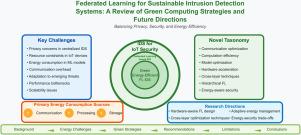可持续入侵检测系统的联邦学习:绿色计算策略与未来方向综述
IF 7.6
3区 计算机科学
Q1 COMPUTER SCIENCE, INFORMATION SYSTEMS
引用次数: 0
摘要
物联网设备的快速扩散带来了双重网络安全挑战:传统的集中式IDS消耗过多的能源并引起隐私问题,而联邦学习实施尽管具有分布式性质,但缺乏全面的可持续性考虑。本研究通过绿色计算的视角系统地回顾了入侵检测系统的联邦学习方法,研究了如何在整个FL-IDS生命周期中整合能源效率和可持续性,同时保持强大的安全性。我们对最近的FL-IDS实施进行了系统的文献回顾,并根据机器学习生命周期阶段(数据准备、本地训练、聚合和推理)开发了一种分类方法,对绿色计算策略进行了分类。我们的分析确定了几种绿色计算策略,包括模型压缩技术、自适应客户端选择、能量感知聚合协议和轻量级推理方法。然而,该综述显示,各研究报告的可持续性指标不一致,目前的FL-IDS文献中仍明显缺乏碳足迹评估。虽然联邦学习展示了可持续入侵检测的潜力,但目前的实施与完全绿色的网络安全系统之间仍然存在巨大差距,这突出了未来研究中对标准化能源指标、碳感知编排以及与可再生能源集成的需求。本文章由计算机程序翻译,如有差异,请以英文原文为准。

Federated learning for sustainable intrusion detection systems: A review of green computing strategies and future directions
The rapid proliferation of IoT devices creates dual cybersecurity challenges: traditional centralized IDS consume excessive energy and raise privacy concerns, while federated learning implementations, despite their distributed nature, lack comprehensive sustainability considerations. This study systematically reviews federated learning approaches for intrusion detection systems through a green computing lens, examining how energy efficiency and sustainability can be integrated throughout FL-IDS life-cycle while maintaining robust security. We conducted a systematic literature review of recent FL-IDS implementations and developed a taxonomy that categorizes green computing strategies according to machine learning life-cycle stages: data preparation, local training, aggregation, and inference. Our analysis identified several green computing strategies including model compression techniques, adaptive client selection, energy-aware aggregation protocols, and lightweight inference methods. However, the review reveals that sustainability metrics are inconsistently reported across studies, and carbon footprint assessments remain notably absent from current FL-IDS literature. While federated learning demonstrates potential for sustainable intrusion detection, significant gaps persist between current implementations and fully green cybersecurity systems, highlighting the need for standardized energy metrics, carbon-aware orchestration, and integration with renewable energy sources in future research.
求助全文
通过发布文献求助,成功后即可免费获取论文全文。
去求助
来源期刊

Internet of Things
Multiple-
CiteScore
3.60
自引率
5.10%
发文量
115
审稿时长
37 days
期刊介绍:
Internet of Things; Engineering Cyber Physical Human Systems is a comprehensive journal encouraging cross collaboration between researchers, engineers and practitioners in the field of IoT & Cyber Physical Human Systems. The journal offers a unique platform to exchange scientific information on the entire breadth of technology, science, and societal applications of the IoT.
The journal will place a high priority on timely publication, and provide a home for high quality.
Furthermore, IOT is interested in publishing topical Special Issues on any aspect of IOT.
 求助内容:
求助内容: 应助结果提醒方式:
应助结果提醒方式:


